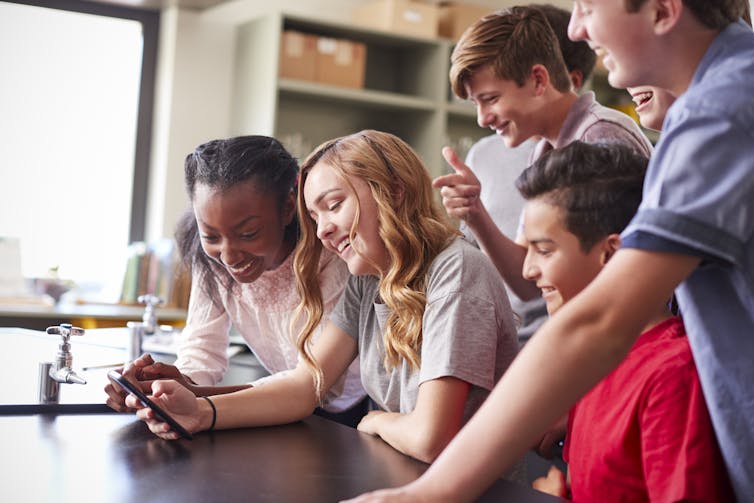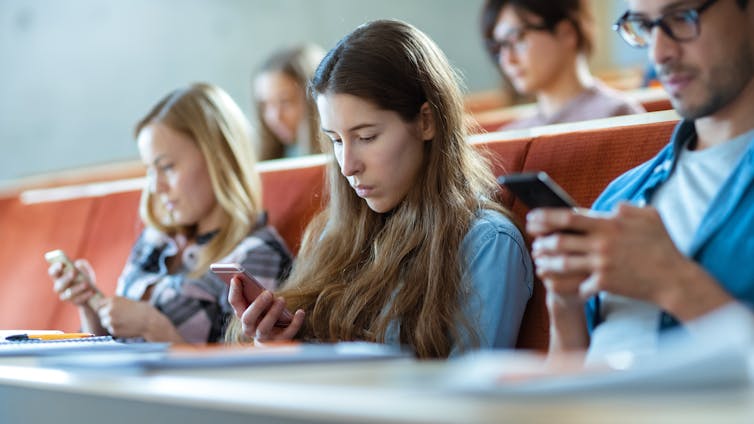
Should smartphones be allowed in classrooms? A new report from UNESCO, the education arm of the United Nations, raises questions about the practice. Though smartphones can be used for educational purposes, the report says the devices also disrupt classroom learning, expose students to cyberbullying and can compromise students’ privacy.
About 1 in 7 countries globally, such as the Netherlands and France, have banned the use of smartphones in school – and academic performance improved as a result, particularly for low-performing students, the report notes.
As school leaders in the U.S. wrestle with whether or not to ban smartphones–and Flagler County schools will ban the use of cell phones during instructional time when classes resume Aug. 10–The Conversation has invited four scholars to weigh in on the issue.
Daniel G. Krutka: Use smartphones to encourage ‘technoskepticism’
While the issue of smartphone use in schools is complicated, evidence suggests that spending more time on smartphones is associated with young people being less happy and less satisfied with life.
Technology scholars have long argued that the key to living well with technology is in finding limits. However, in banning smartphones, I worry educators might be missing opportunities to use smartphones to encourage what I and other researchers refer to as technoskeptical thinking; that is, questioning our relationship with technology.
For example, students might be encouraged to consider the benefits and drawbacks of using navigational apps to travel from one place to another, as opposed to old-fashioned paper maps. Or, students might explore their social media feeds to critique what algorithms feed them, or how notifications get their attention.
In my research, I have looked at how teachers can encourage students to go on techno-fasts – that is, abstaining from the use of technology for a certain period of time. This, I argue, will give students time to reflect on the time they spend away from their devices.
Policy debates often focus on whether or not to put smartphones out of reach during the school day. But I believe educators might find it more beneficial to make the phones an object of inquiry.

monkeybusinessimages/iStock via Getty Images
Sarah Rose: Consult parents, teachers and students
While there is evidence that classroom phone usage can be a distraction, it can also promote engagement and learning. While research about the potential positive and negative consequences of classroom phones can be used to inform school phone policies, the views of those who are most directly impacted by the policies should also be taken into account.
The views of parents matter because their views may influence the extent to which their children follow the policy. The views of children matter because they are the ones being expected to follow the policy and to benefit from it. The views of teachers matter because they are often the ones that have to enforce the policies. Research shows that enforcing cellphone policies is not always a straightforward issue.
In my research, I have found that children – aged 10 and 11 years old – in collaboration with their parents, were able to come up with ideas for ideal policies and solutions to help enforce them. For example, one parent-child pair suggested mobile phone use in school could be banned but that a role of “telephone monitor” could be given to an older pupil. This “telephone monitor” would have a class mobile phone that children and parents could use to contact each other during the school day when necessary.
This recommendation reflected how parents and middle and high school students – whether from rural and urban areas – felt cellphones were important to keep in touch with each other during the school day. Beyond safety, children and parents also told us that phones were important for keeping in touch about changing plans and for emotional support during the school day.
I believe policies that simply ban phones in schools may be missing an opportunity to educate children about responsible mobile device use. When parents and children are involved in policy development, it has the potential to increase the extent to which these policies are followed and enforced.

gorodenkoff/iStock via Getty Images
Arnold L. Glass: Cellphone use in college lectures hurts performance in ways that are hard to see
The intrusion of internet-enabled electronic devices, such as laptops, tablets and cellphones, has transformed the modern college lecture. Students now divide their attention between the lecture and their devices. Classroom studies reveal that when college students use an electronic device for a nonacademic purpose during class, it hurts their performance on exams.
When attention is divided between an electronic device and the classroom lecture, it does not reduce comprehension of the lecture – at least, not when measured by within-class quizzes. Instead, divided attention reduces long-term retention of the classroom lecture, which hurts performance on unit exams and final exams.
When some students open electronic devices, it also negatively affects the performance of all the students around them. Research has shown that student performance on final exams was worse when electronic devices were permitted during classes that covered exam material versus when the devices were not.
Many students won’t think their divided attention is affecting their retention of new information. It may not be for the moment, but a couple of weeks later or down the line, research shows, it does.
Louis-Philippe Beland: Bans help low-achieving students the most
Numerous studies indicate that low-achieving students stand to benefit the most from the implementation of mobile phone bans in schools.
In a 2015 study, my co-author, Richard Murphy, and I examined the impact of banning mobile phones on student performance in high schools, using data from England. By comparing schools with phone bans to similar schools without the bans, we isolated the effect of mobile phones on performance. Our study found that banning mobile phones significantly increased test scores among 16-year-old students. The effect is equivalent to adding five days to the school year or an extra hour per week. Low-achieving students benefited more, while high-achieving students remained unaffected.
Similar studies in Spain and Norway using a similar approach demonstrated compelling evidence supporting the benefits of banning mobile phones. In Spain, grades improved and bullying incidents decreased. In Norway, the ban raised middle school students’ grade-point averages and their likelihood of attending academic high schools while reducing bullying. Evidence from Belgium suggests banning mobile phones can be beneficial for college student performance.
Psychological research sheds light on potential mechanisms behind the impact of mobile phones and technology on student performance. Multitasking, common with mobile phone use, has been found to hinder learning and task execution. Taking notes by hand has been shown to better enhance memory retention compared to typing on a computer.
In sum, banning mobile phones in schools can yield positive effects, improve academic performance and narrow the achievement gap between high- and low-achieving students. However, it is crucial to acknowledge that mobile phones and technology can also be valuable educational tools when used appropriately.
This article is republished from The Conversation under a Creative Commons license. Read the original article.
![]()
Louis-Philippe Beland is Associate Professor of Economics at Carleton University; Arnold Lewis Glass is Professor of Psychology at Rutgers University; Daniel G. Krutka is Associate Professor of Social Studies Education at the University of North Texas, and Sarah Rose is a Senior Lecturer in Psychology and Child Development at Staffordshire University.




























JimboXYZ says
The students that are distracted from learning need to be removed. Outside of that there’s no way you can say a student shouldn’t have a smartphone in a classroom on a vibration alert mode. The students that don’t learn, they’ll either succeed or fail in life for that. I can already see this creating an issue. Teachers need to stick to presenting the learning material and grading performance. They shouldn’t be influencing the natural order of the bell curve. The bar shouldn’t be lowered for student accomplishment.
pete says
Leave them at home
feddy says
Phones left in lockers or turned off in classrooms, no exceptions.
R.S. says
If used wisely, cell phones can be most helpful. In my retirement now, the phone helps jog vague memories by a quick look-up of facts. Yes, the high-tech companies do their level best to distract folks with silly games, solitaire nonsense, magic muppets or golden nuggets. To learn resistance to this garbage, one needs to start early. A student-centered curriculum with active problem solving supported by tools from the internet cannot be begun too early. Of course, open-ended learning also has its pitfalls in a fascistically developing ambience as in Florida. What if kids at an early level were to find out about WOKE or why BLACK LIVES MATTER!? Perhaps our emphasis should be on knocking the wind out of the Florida racists and the gaming industry, not the knowledge-creating industries.
tulip says
Phones shouldn’t be in the classroom at all. If there is an emergency, the school would be notified and, therefore, would notify the student(s) Even having the phone on vibrate is a distraction because, without realizing it, the student is constantly on the alert to feel the vibration and then goes nuts if he or she can’t answer the phone. All of that takes away their attention from their learning process. It also allows cheating on tests because they can text each other for answers.
Jack says
Students that need to have contact with their parent throughout the day already have a problem.
Parents that need to have continual contact with their child have a problem.
If there is really a need to reach your student- call the front desk. Very simple.